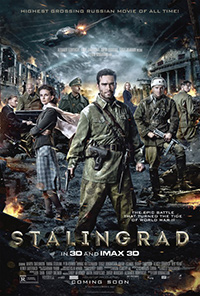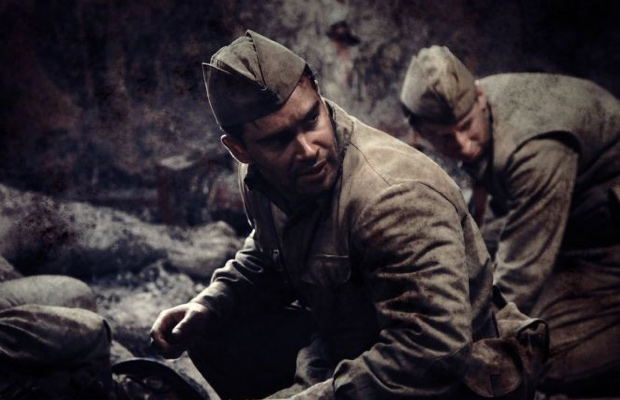Reviews
Stalingrad | Review
Back in the U.S.S.R.: Bondarchuk’s Latest a Visual Feast and Narrative Folly
 Arriving with a small coterie of distinctive firsts, actor/director Fedor Bondarchuk’s latest directorial effort happens to be the first Russian film to be presented in 3D (one would have assumed Timur Bekmambetov would have nabbed that distinction had he stayed in the motherland), as well as laying claim to number one at the Russian box office and nabbing the honor of being the Foreign Language submission for this year’s Academy Awards.
Arriving with a small coterie of distinctive firsts, actor/director Fedor Bondarchuk’s latest directorial effort happens to be the first Russian film to be presented in 3D (one would have assumed Timur Bekmambetov would have nabbed that distinction had he stayed in the motherland), as well as laying claim to number one at the Russian box office and nabbing the honor of being the Foreign Language submission for this year’s Academy Awards.
Digging deeper, Russian cineastes will recognize the famed Bondarchuk name—while Fedor has gone on to make a prolific name for himself as an actor turned director, he is the son of director Sergei Bondarchuk (War & Peace, 1966) and brother to actress Natalya Bondarchuk (star of Tarkovsky’s Solaris, 1972).
With such a rich history behind him, the decision to make an epic 3D extravaganza out of the WWII Battle of Stalingrad, one of the bloodiest battles in the history of warfare, hardly seems surprising. And as much time and energy that’s been lovingly poured into spectacle, it plays like a heavy-handed swell of patriotic propaganda, every quiet moment seemingly propelled into bludgeoning us with a barely concealed, self-congratulating message.
Opening amidst a rescue team of Russian aids fishing out German survivors after a Japanese tsunami in modern times, a friendly fellow, Gromov (Pyotr Fyodorov) attempts to calm a group of nine trapped teens via radio by sharing his mother’s tale about how he had five fathers. We’re forced, like the trapped incredulous teens, into Gromov’s omniscient narration which leads us back to November of 1942, where his eighteen year old mother Katya (Mariya Smolnikova) has eluded evacuation and lives in her abandoned building after witnessing the execution of all her family and neighbors before being brutally raped by German soldiers.
A ragtag group of Russian soldiers attempt to move into Stalingrad, currently occupied by the Germans, who alight their store of fuel and pour it strategically on the Russians. Soldiers on fire scream their way violently into the German foxholes, where hand to hand battle ensues, leading surviving troops into the city, where a small group sets up command in the building where Katya is hiding, whom the troupe is immediately drawn to. She represents a beacon of hope and rebellion, becoming a mascot as well as a romantic entanglement for several of the soldiers. Meanwhile, the opposing German force is determined to rid the building of the Russian soldiers, a responsibility which falls on the shoulders of Captain Peter Kahn (Thomas Kretschmann), whose love for a Russian woman, Masha (Yanina Studilina) has caused a certain amount of disinterest in the carnage around him.
Indubitably, there’s a grandiose, epic flavor threading throughout Stalingrad, which focuses on a very miniscule timeframe over one particular group of men, mostly due to some of the sumptuous visuals, orange skylines gazing over what could be a blue/gray hell on earth. Smoke and ash, perhaps the best use of the unnecessary 3D technology, floats everywhere, obfuscating clear views or glances at anything, like dirty snow. However, its countless battle sequences soon leave us visually shell-shocked, especially after an early sequence involving burning soldiers as they storm into the city. There’s a nagging difficulty in sometimes deciphering who is killing who in several hand to hand sequences, as well. Worse is the ridiculous entry point into the narrative, an overly complicated flourish to rationalize the voluminous narration, a flair that actually diminishes the dramatic effect because it’s so awkwardly silly.
For as visually epic as Stalingrad would have you believe it is, there aren’t any characters of the same caliber. Gromov’s convenient narration gives us snippets of several soldiers’ backgrounds, always overlaying some type of action. But character development isn’t enhanced by shorthand and there’s not much by way of distinction between the Russian soldiers. The Germans, not surprisingly, get short shrift, standard prissy clichés (Heiner Lauterbach as a hysterical colonel), with the exception of Kretschmann, a lonely captain drawn to a beautiful Russian woman that he basically rapes because she doesn’t dare say no, a victim of circumstance a la Tornatore’s Malena (2000). But as hard as it tries, Stalingrad is one prodigious, albeit loudly dressed, cliché.
★★ / ☆☆☆☆☆
Los Angeles based Nicholas Bell is IONCINEMA.com's Chief Film Critic and covers film festivals such as Sundance, Berlin, Cannes and TIFF. He is part of the critic groups on Rotten Tomatoes, The Los Angeles Film Critics Association (LAFCA), the Online Film Critics Society (OFCS) and GALECA. His top 3 for 2021: France (Bruno Dumont), Passing (Rebecca Hall) and Nightmare Alley (Guillermo Del Toro). He was a jury member at the 2019 Cleveland International Film Festival.
























